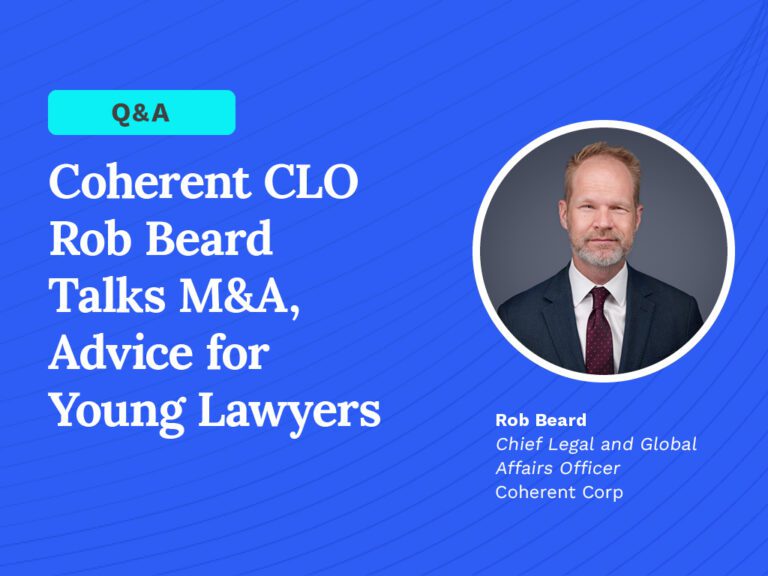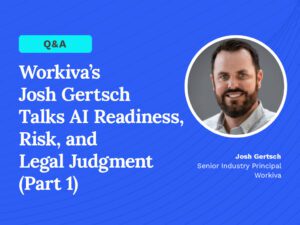Coherent CLO Rob Beard Talks M&A, Advice for Young Lawyers
June 23, 2025

Rob Beard is the Chief Legal and Global Affairs Officer at the materials, networking, and lasers company Coherent Corp. He has more than 20 years of senior international experience across business, policy, and legal. Before joining Coherent, Beard was the Chief Legal and Global Affairs Officer at Mastercard, and spent nearly a decade at semiconductor company Micron Technology.
In this second part of our exclusive interview with Coherent Chief Legal and Global Affairs Officer Rob Beard, he discusses M&A trends and offers advice for young lawyers. Part one of our interview about legal leadership and the tariff situation can be found here.
In your past role at Micron, you were heavily involved with M&A deals. With interest rates still elevated and financing more expensive, how has dealmaking changed? Are legal teams being asked to get more creative or cautious in how transactions are structured?
Rob Beard: It’s hard to do M&A in a period of uncertainty. You see deals go on pause when the economy starts to soften or when some exogenous event occurs. Once it’s sort of settled, even if you’re still in a downturn, deals still happen and they even pick up pace in a downturn. But it is that period of when you’re trying to catch a falling knife that makes it really hard to go out and do a deal because you just don’t know where you’re going to land. In a tough environment, I think there are a couple of things that the legal team can do that would be really helpful to deal activity. I think number one, it’s helping the business ensure it does really good due diligence.
It can feel easy to outsource due diligence to your law firm and to expect them to give you answers or to see things that you’re not really able to see yourself. Typically, we own the diligence process and it’s like the least sexy thing we could be talking about here. But because we own the diligence process, we are the gatekeepers to ensuring that the company really understands the deal it’s about to do, to make a deal that works in the environment in which it’s being executed.
That’s one area where AI, for example, can be very useful and can augment a lawyer’s intelligence or augment a lawyer’s ability to really understand a target. Because you can use it to gain information, gather information and synthesize that information in a way that you might not have been able to in the past.
And beyond that, AI is giving lawyers the ability to sort of exercise their creativity and do things that they wouldn’t have done in the past because it was either time or cost prohibitive.
You have taught law at the University of Illinois College of Law and you’ve spoken at commencements. Clearly you care about mentorship and education. What’s your advice to the next generation of lawyers right now?
Rob Beard: That’s a good one. It’s interesting. I graduated law school in 2008. In 2008, law firms still had law libraries. Lots of people would still go to the law library to pull cases from books. But what you saw, starting before I graduated law school and certainly accelerating after, is you saw the lawyers who were willing to embrace and learn how to use Westlaw and LexisNexis really, really well. Those lawyers excelled, while the ones who had to call the law librarian for information or had to go to the law library to pull books did not. They became sort of dinosaurs.
That was sort of a pivotal moment in legal practice, particularly on the litigation side. I think we’re at a similar stage today, but on a much, much larger scale with much more severe or dramatic consequences, in terms of learning to understand how to embrace the technology tools that are available to us. AI technology is extremely powerful and has the ability to do for a lawyer what Westlaw did for a lawyer 20 years ago—but times like a million.
If we really want lawyers to be leaders in organizations, we need to equip them with the tools to be leaders in their organizations. Most of the time what happens right now is lawyers go through law school and they are taught a way to think, but they’re not taught at all how to apply that way of thinking. And I think we need to get more into the application of that way of thinking, including the ability to understand how they can use technology to do things.
How are we going to use an AI agent approach or how are we going to use an LLM to get information for us that we can then use to be better business partners or to be better litigators or to think more creatively for a solution? And then also learning to leverage those tools to do non-value-added tasks.
Also, law firms are going to have to recalibrate their approach. And that’s going to be doubly true with AI because pretty soon I’m going to start telling my law firms, I’m not going to pay a second-year associate to do something AI could do. If AI can do it, I’m not paying a human to do it.
So the firms will have to think about their model differently, and I think it needs to go back to sort of the apprentice-type model that lawyers used to have, which is a young lawyer sits with a senior lawyer and learns from that person and isn’t necessarily billed out all the time.
Is there anything else that you wanted to talk about or mention?
Rob Beard: I think a lot of lawyers either believe or are somehow incentivized to believe that being a good lawyer is an individual sport and I don’t think anything could be further from the truth. I think being a great lawyer is the ultimate team game. I am a big believer in a team first approach.
If you follow sports, sort of think about the great sports teams that are system sports teams where you could sort of plug in anybody. You could draft a new wide receiver and plug ’em into the system and the team’s going to win. You don’t have to have the most expensive or the highest flying, most well-known person because the system is so good. I think that’s really the secret to success for a corporate in-house team is a team-first approach. An approach that really focuses on what’s best for the organization, allows people to learn and grow, but is also not afraid to let them fly out of the nest.
Read part one of our interview with Beard about legal leadership and the tariff situation.
Must read intelligence for general counsel
Subscribe to the Daily Updates newsletter to be at the forefront of best practices and the latest legal news.
Daily Updates
Sign up for our free daily newsletter for the latest news and business legal developments.




